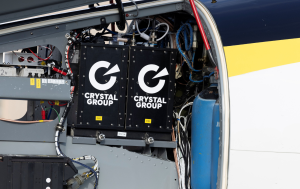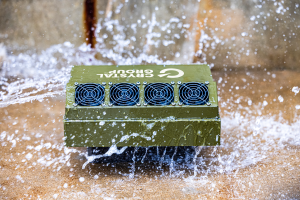As the United States advances the Golden Dome for America initiative, industry and government must focus on enabling technology such as rugged, reliable computing at the edge. Success depends on technology that performs under pressure, survives in extreme environments, and delivers data when it matters most.

Crystal Group brings decades of experience in designing, building, and testing high-performance rugged compute solutions that align closely with these mission needs. With proven deployments supporting current U.S. and allied nations’ missile defense and radar programs, the company has demonstrated the reliability, adaptability, and technical rigor needed for large-scale, national defense initiatives. With flexible development capabilities, U.S.-based design and manufacturing, and performance validated across both defense and commercial sectors, Crystal Group stands ready to contribute to this national effort.
Tailored development for harsh environments
Golden Dome systems are likely to be deployed across land, air, sea, and space, each with its own environmental and operational challenges. Computing hardware in these settings must endure extreme shock, vibration, extreme temperatures, and electromagnetic interference without compromising performance.
Crystal Group’s approach to rugged design centers on flexibility and customization. Its engineering teams collaborate directly with customers to define environmental, mechanical, and electrical parameters, then develop compute platforms that meet or exceed them. Whether it’s thermal management in a sealed enclosure, vibration isolation for airborne use, or custom connector design for naval integration, each system is built for purpose.
This adaptability ensures that compute systems not only meet the environmental demands of Golden Dome but can also evolve as mission requirements expand or shift.
Deployable, state-of-the-art compute at the edge
Modern missile defense relies on distributed data processing. To reduce latency and strengthen resilience, compute power must extend all the way to the edge, near sensors, interceptors, and command nodes.

Crystal Group’s rugged servers, embedded computers, and networking devices deliver the latest IT advancements in deployable form factors. Designed and tested to MIL-STD-810, MIL-STD-461, and other defense standards, these systems maintain continuous performance where commercial equipment cannot.
Edge-deployable compute also supports autonomous decision-making and data fusion, critical to Golden Dome’s goal of integrating sensors and interceptors into a unified defense network.
U.S. in-house design for interface and power
Defense initiatives of this scale demand absolute confidence in system integrity and supply chain control. Crystal Group’s fully U.S.-based design, assembly, and testing, all conducted in its ISO 9001:2015/AS9100D-certified facility, offer that assurance.
In-house engineering control extends beyond processing hardware to include power delivery, interface configuration, and EMI/EMC design. By owning these critical elements, Crystal Group can ensure compatibility, reliability, and long-term maintainability across mission-critical networks.
This domestic control also supports compliance with export regulations and enhances cybersecurity—an essential consideration in distributed defense computing systems.
Dual-use capability across defense and industry
Golden Dome represents a defense-first mission, but its supporting technologies draw from both military and commercial innovation. Crystal Group operates at that intersection.
As an employee-owned U.S. manufacturer, the company has long served both traditional defense customers and industrial markets such as energy, transportation, and autonomous trucking. This dual-use foundation accelerates innovation while maintaining rigorous quality standards. The same ruggedization, power efficiency, and modularity that support frontline defense systems also strengthen industrial resilience.

In Golden Dome’s context, dual-market agility enables faster prototyping, shorter lead times, and adaptable configurations, without compromising mission assurance. 
Looking forward
Golden Dome’s vision is ambitious: a layered, responsive defense system built on integrated data, distributed computing, and real-time decision capability. Achieving it will require not only advanced software and sensors but also the rugged hardware that connects them all.
With its proven experience in custom rugged development, edge-ready compute architectures, U.S.-based engineering, and dual-use capability, Crystal Group exemplifies the kind of innovation and reliability this initiative demands.
Rugged performance, trusted design, and a commitment to excellence, these are the qualities that turn bold concepts like Golden Dome into operational reality.